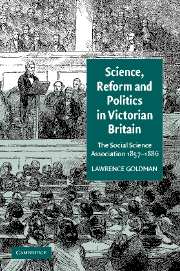Book contents
- Frontmatter
- Contents
- List of illustrations
- Acknowledgements
- Note on citations in the text
- List of abbreviations
- Introduction: the contexts of the Social Science Association
- Part I POLITICS
- Chapter 1 The origins of the Social Science Association: legal reform, the reformation of juveniles, and the property of married women in ‘the Age of Equipoise’
- Chapter 2 The Social Science Association and the structure of mid-Victorian politics
- Chapter 3 Organising the Social Science Association
- Part II REFORM
- Part III SCIENCE
- Part IV DECLINE
- Conclusion: The Social Science Association and social knowledge
- Appendix I The founders of the Social Science Association, 29 July 1857
- Appendix II Social Science Association Congresses, 1857–1884
- Appendix III Presidents of the Social Science Congresses, 1857–1884
- Appendix IV Departmental presidents, 1857–1884
- Select bibliography
- Index
Chapter 1 - The origins of the Social Science Association: legal reform, the reformation of juveniles, and the property of married women in ‘the Age of Equipoise’
Published online by Cambridge University Press: 22 September 2009
- Frontmatter
- Contents
- List of illustrations
- Acknowledgements
- Note on citations in the text
- List of abbreviations
- Introduction: the contexts of the Social Science Association
- Part I POLITICS
- Chapter 1 The origins of the Social Science Association: legal reform, the reformation of juveniles, and the property of married women in ‘the Age of Equipoise’
- Chapter 2 The Social Science Association and the structure of mid-Victorian politics
- Chapter 3 Organising the Social Science Association
- Part II REFORM
- Part III SCIENCE
- Part IV DECLINE
- Conclusion: The Social Science Association and social knowledge
- Appendix I The founders of the Social Science Association, 29 July 1857
- Appendix II Social Science Association Congresses, 1857–1884
- Appendix III Presidents of the Social Science Congresses, 1857–1884
- Appendix IV Departmental presidents, 1857–1884
- Select bibliography
- Index
Summary
On 12 October 1857, ‘between five and six thousand’ people crowded into the Birmingham Town Hall to hear the inaugural address delivered by Lord Brougham at the first congress of the Social Science Association. Lord John Russell, formerly prime minister, seconded by William Cowper, President of the Board of Health, then moved the resolution inaugurating the new organisation. The meeting was attended by ‘a large number of the gentry, bankers, merchants and manufacturers of the town and district’. Representatives of the various groups from which the SSA had been constructed sat on the platform, flanked by sundry members of parliament and other worthies. They included Charles Kingsley, Joseph Sturge, Edwin Chadwick, John Simon, and Thomas Southwood Smith. Letters of apology were read from, among others, Lord Shaftesbury, Sir James Kay-Shuttleworth, and F. D. Maurice, who would all assume their places at the Association in subsequent years. The celebrated African explorer, Dr Livingstone, was present for the Mayor's banquet some days later. The aged Robert Owen drifted through the events of the week, a link with a very different tradition of ‘social science’ and an earlier, more troubled age.
For six days hundreds of people in dozens of meetings deliberated on the social condition of the nation. ‘So numerous were the papers to be read, and so lively and prolonged the discussion’ that the sessions overran and required an extra morning.
- Type
- Chapter
- Information
- Science, Reform, and Politics in Victorian BritainThe Social Science Association 1857–1886, pp. 27 - 60Publisher: Cambridge University PressPrint publication year: 2002



